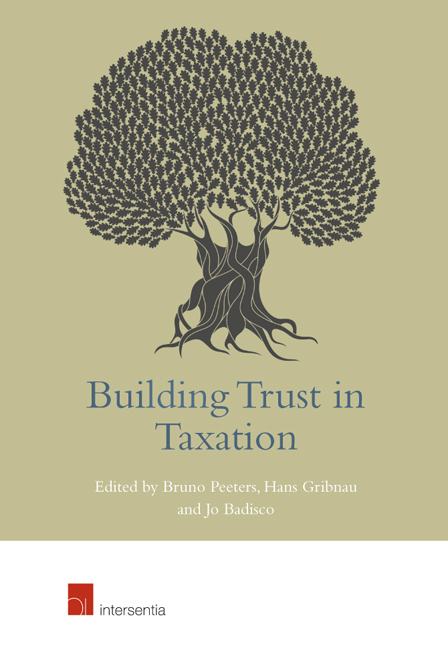Book contents
- Frontmatter
- Preface
- Contents
- List of Authors
- Introduction
- PART I TAXATION, STATE AND SOCIETY: RECIPROCITY AND THE LIMITS OF THE POWER TO TAX
- PART II Trust and morality: tax governance in need of transparency
- PART III International taxation: in search of democratic legitimacy
- Improving Democratic International Tax Governance: On the Power of Citizens, Transparency and Independent Watchdogs
- International Tax Justice Between Machiavelli and Habermas
- International Taxation without International Representation? Legality and Legitimacy in Global Tax Governance
- Tax Sovereignty and the Globalised Process of Law-Making: The Proposal of the UN Code of Conduct on Cooperation in Combating International Tax Evasion
- PART IV Behavioural aspects of taxation and trust
Tax Sovereignty and the Globalised Process of Law-Making: The Proposal of the UN Code of Conduct on Cooperation in Combating International Tax Evasion
from PART III - International taxation: in search of democratic legitimacy
Published online by Cambridge University Press: 21 September 2018
- Frontmatter
- Preface
- Contents
- List of Authors
- Introduction
- PART I TAXATION, STATE AND SOCIETY: RECIPROCITY AND THE LIMITS OF THE POWER TO TAX
- PART II Trust and morality: tax governance in need of transparency
- PART III International taxation: in search of democratic legitimacy
- Improving Democratic International Tax Governance: On the Power of Citizens, Transparency and Independent Watchdogs
- International Tax Justice Between Machiavelli and Habermas
- International Taxation without International Representation? Legality and Legitimacy in Global Tax Governance
- Tax Sovereignty and the Globalised Process of Law-Making: The Proposal of the UN Code of Conduct on Cooperation in Combating International Tax Evasion
- PART IV Behavioural aspects of taxation and trust
Summary
ABSTRACT
This chapter examines effects of globalisation on taxation, in particular the transformation it has caused in law-making.
Literature on the topic is abundant and widespread but the angle taken in this chapter gives insight into the interactions between the new style of governance and the recent proposals of the implementation of the UN Code of Conduct and the modification of the EU Code of Conduct on Business Taxation.
Although the process of the change in law-making – the increase in the use of soft law rules instead of the traditional hard law methods – started before globalisation gained attention as a phenomenon, globalisation has also been a strong catalyst for this transformation. The use of law decrees in Italy is a trend that has been diminishing the central role of law there; the role of the soft law at European Union and International levels is also examined in this respect. The rise in the use of soft law involves an increasing trend of undermining the basic democratic process and leads to the possible loss of legitimacy. This chapter presents some thoughts on how the recent proposals of Codes of Conduct in fiscal matters could boost nations ‘ sense of being party to a global contract.
BACKGROUND
Globalisation is a complex phenomenon that involves a vast array of tendencies and trends in economic, social, and cultural fields and that influences all aspects of social life. Globalisation, as it developed at the end of the twentieth century, is mainly the result of a process of complete change in how scientific knowledge is produced. For its features, this mechanism has a multifaceted character and thus does not lend itself to one sole definition. For the purposes of this chapter, however, it can be considered as ‘ increasing and intensified flows between countries of goods, capital, services, ideas, information and people which produces cross-border integration of a number of economic, social and economic activities ‘. The term ‘ global ‘ is not used as a synonymous for ‘ international ‘, because it involves different levels of socio-spatial interactions. A world economy with very high levels of international trade and investment would not necessarily be a globalised economy.
- Type
- Chapter
- Information
- Building Trust in Taxation , pp. 285 - 308Publisher: IntersentiaPrint publication year: 2017



